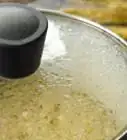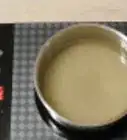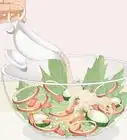This article was co-authored by wikiHow staff writer, Jessica Gibson. Jessica Gibson is a Writer and Editor who's been with wikiHow since 2014. After completing a year of art studies at the Emily Carr University in Vancouver, she graduated from Columbia College with a BA in History. Jessica also completed an MA in History from The University of Oregon in 2013.
The wikiHow Video Team also followed the article's instructions and verified that they work.
This article has been viewed 228,242 times.
Learn more...
Hummus is a classic Middle Eastern dip that's enjoying renewed popularity. If you'd like to make your own, decide if you have time to soak and boil dried chickpeas. To make the hummus from scratch, blend your soaked chickpeas with garlic, tahini, and seasonings. For a quicker version, drain canned chickpeas and blend them with the garlic, tahini, and lemon juice. Drizzle your hummus with olive oil and serve it with pita or raw vegetables.
Ingredients
- 1 cup (200 g) of dried chickpeas
- 1 1/2 teaspoons (9 g) of baking soda
- Water, as needed
- 1 medium clove garlic
- 1/2 cup (112 g) of tahini
- 1/2 teaspoon (2.5 g) of kosher salt, or more as needed
- 2 tablespoons (30 ml) of fresh lemon juice, or more as needed
- Extra-virgin olive oil, for serving
- Ground sumac or paprika, for serving
Makes 2 1/2 cups (615 g) of hummus
- 1 15-ounce (425 g) can of chickpeas
- 3 tablespoons (44 ml) of extra-virgin olive oil
- 3 tablespoons (44 ml) of tahini
- 1 1⁄2 tablespoons (22 ml) of lemon juice, plus more as needed
- 1 small clove of garlic
- 1 teaspoon (5.5 g) of salt
- 1/2 teaspoon (1 g) of finely ground black pepper
Makes 1 1/3 cups (327 g) of hummus
Steps
Hummus from Scratch
-
1Cover the chickpeas with 2 in (5 cm) of water and soak them overnight. Put 1 cup (200 g) of dried chickpeas into a large bowl and pour in enough water to cover them by at least 2 inches (5.1 cm). Keep the chickpeas out and room temperature overnight to soak.
- If you're short on time, put the chickpeas in pot and cover them with boiling water. Soak the chickpeas in the hot water for 1 hour.
-
2Drain and dry the chickpeas. Put a colander in the sink and pour the soaked chickpeas into it. Then use paper towels or a clean kitchen towel to pat the chickpeas dry.Advertisement
-
3Mix the chickpeas with baking soda and cook them for 3 minutes. Put the chickpeas into a large pot and scatter 1 1/2 teaspoons (9 g) of baking soda over them. Stir the chickpeas so they're coated with the baking soda and turn the burner to medium. Cook the chickpeas until they're warmed through.
- The baking soda will help the skins slip from the chickpeas, which will make the hummus smooth.
-
4Cover the chickpeas with 2 inches (5.1 cm) of water and bring it to a boil. Pour in enough water to cover the chickpeas and turn the burner up to high. Heat the chickpeas until the water begins to boil.
-
5Simmer the chickpeas for 45 to 60 minutes over medium-low heat. Turn the burner down so the water bubbles gently. Let the chickpeas cook uncovered until they're soft.
- Since boiling time will depend on your chickpeas, you may need to cook them longer until they're soft.
-
6Turn off the burner and scoop away the loose chickpea skins. Stir the chickpeas well to loosen the skins. Then use a slotted spoon to scoop away and discard the loose skins that float to the top of the water.
- You can stir the chickpeas again to get more of the skins to float to the top.
-
7Drain the chickpeas and reserve 1 cup (240 ml) of the cooking water. Set a fine mesh strainer over a large bowl and pour the chickpeas into it. Use your fingers to rub the chickpeas and the remaining skins. Set aside 1 cup (240 ml) of the water in the bowl and refrigerate it for at least 2 hours.
- Discard the extra cooking water.
- You should have 2 cups (400 g) of cooked chickpeas in the strainer. If you have more than this, use them in another recipe.
-
8Blend the garlic and chickpeas for 3 to 4 minutes. Put the drained chickpeas into a blender or food processor and add 1 clove of garlic. Place the lid on the blender and combine the ingredients until the chickpeas are smooth.
- The chickpeas should be very thick like a firm paste.
-
9Blend in the tahini, salt, juice, and reserved chickpea liquid. Add 1/2 cup (112 g) of tahini, 1/2 teaspoon (2.5 g) of kosher salt, and 2 tablespoons (30 ml) of fresh lemon juice. Blend the hummus until it's smooth and add 1 tablespoon (15 ml) of the reserved chickpea liquid at time.
- The hummus should be smooth and lightened in texture.
- You may not need all of the reserved chickpea liquid.
-
10Taste and serve the hummus. Add more salt, pepper, and lemon juice according to your taste. Then spoon the hummus onto a serving plate and drizzle extra-virgin olive oil on top. Sprinkle a little ground sumac or paprika over the hummus and serve it with pita and raw vegetables.
- Refrigerate the leftover hummus in an airtight container for up to 1 week.
Quick Hummus
-
1Drain and rinse 1 can of chickpeas. Set a fine mesh strainer over a bowl and open a 15-ounce (425 g) can of chickpeas. Pour the chickpeas into the strainer so the liquid drains into the bowl. Set the bowl aside and run cold water over the chickpeas to rinse them.
-
2Put the chickpeas in a food processor with oil, tahini, juice, and garlic. Transfer the rinsed chickpeas to a food processor and pour in 3 tablespoons (44 ml) of extra-virgin olive oil and 1 1⁄2 tablespoons (22 ml) of lemon juice. Add 3 tablespoons (44 ml) of tahini and 1 small clove of garlic.
- If you don't have cloves of garlic, substitute 1 teaspoon (3 g) of minced garlic.
-
3Blend the ingredients for 3 to 5 minutes. Put the lid on the food processor and blend the ingredients until they combine. Keep blending until the chickpeas become completely smooth.
- You may need to stop and scrape down the sides of the food processor occasionally.
-
4Add the salt and pepper and taste the hummus. Add 1 teaspoon (5.5 g) of salt and 1/2 teaspoon (1 g) of finely ground black pepper. Pulse the hummus to incorporate the seasoning and then taste the hummus. Adjust the flavor and texture according to your taste.
- For example, if you want thinner hummus, add a few spoonfuls of the liquid you drained from the can of chickpeas.
- For a brighter tasting hummus, add more fresh lemon juice or blend in some chopped preserved lemons.
-
5Serve the quick hummus. Spoon the hummus into a serving bowl and consider drizzling the top with some extra-virgin olive oil. For a quick garnish, sprinkle a little paprika or cumin over the hummus. Set out pita bread or chips and raw vegetables to dip into the hummus.
- Cover and refrigerate leftover hummus for up to 1 week.
Ways to Eat Hummus and Recipes
Community Q&A
Did you know you can get answers researched by wikiHow Staff?
Unlock staff-researched answers by supporting wikiHow
-
QuestionIs hummus good for you?
 wikiHow Staff EditorThis answer was written by one of our trained team of researchers who validated it for accuracy and comprehensiveness.
wikiHow Staff EditorThis answer was written by one of our trained team of researchers who validated it for accuracy and comprehensiveness.
Staff Answer wikiHow Staff EditorStaff Answer
wikiHow Staff EditorStaff Answer -
QuestionIs it okay to eat hummus every day?
 wikiHow Staff EditorThis answer was written by one of our trained team of researchers who validated it for accuracy and comprehensiveness.
wikiHow Staff EditorThis answer was written by one of our trained team of researchers who validated it for accuracy and comprehensiveness.
Staff Answer wikiHow Staff EditorStaff Answer
wikiHow Staff EditorStaff Answer -
QuestionDoes hummus give you gas?
 wikiHow Staff EditorThis answer was written by one of our trained team of researchers who validated it for accuracy and comprehensiveness.
wikiHow Staff EditorThis answer was written by one of our trained team of researchers who validated it for accuracy and comprehensiveness.
Staff Answer wikiHow Staff EditorStaff Answer
wikiHow Staff EditorStaff Answer
Things You'll Need
Hummus from Scratch
- Measuring cups and spoons
- Large bowl
- Colander
- Large pot
- Spoon
- Slotted spoon
- Fine mesh strainer
- Blender or food processor
- Serving platter
Quick Hummus
- Measuring cups and spoons
- Can opener
- Fine mesh strainer
- Bowl
- Blender
- Serving bowl
- Spoon
References
- ↑ https://www.washingtonpost.com/recipes/whipped-hummus/14882/?utm_term=.9914fb329c0e
- ↑ https://www.thekitchn.com/how-to-make-hummus-from-scratch-cooking-lessons-from-the-kitchn-107560
- ↑ https://thestonesoup.com/blog/best-tahini-substitutes/
- ↑ https://www.thekitchn.com/how-to-make-hummus-from-scratch-cooking-lessons-from-the-kitchn-107560
- ↑ https://www.thekitchn.com/how-to-make-hummus-from-scratch-cooking-lessons-from-the-kitchn-107560
- ↑ https://www.thekitchn.com/how-to-make-hummus-from-scratch-cooking-lessons-from-the-kitchn-107560
About This Article
To make simple hummus, soak 1 cup of dried chickpeas in water overnight. In a large pot, cook the drained chickpeas over medium head with 1.5 teaspoons of baking soda for 3 minutes, and then add water. Bring the water to a boil and simmer the chickpeas for 45-60 minutes over medium-low heat. Then, reserve a cup of water, drain the chickpeas, and then blend the chickpeas and 1 clove of garlic for 3-4 minutes. Blend in 1/2 cup of tahini, 1/2 teaspoon of salt, 2 tablespoons of lemon juice, and 1 tablespoon of reserved water to finish the hummus. For tips on making a quick hummus, scroll down!
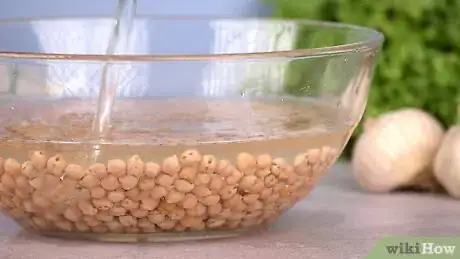
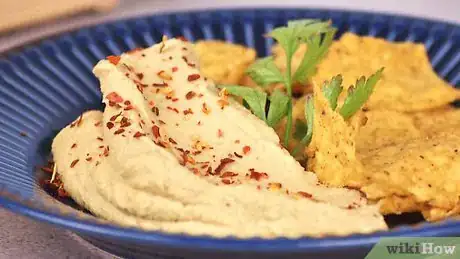
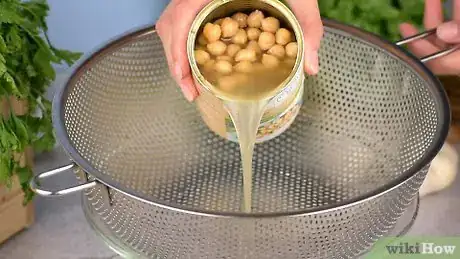
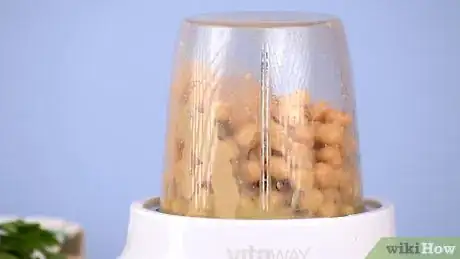
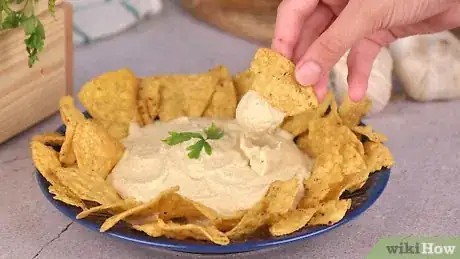
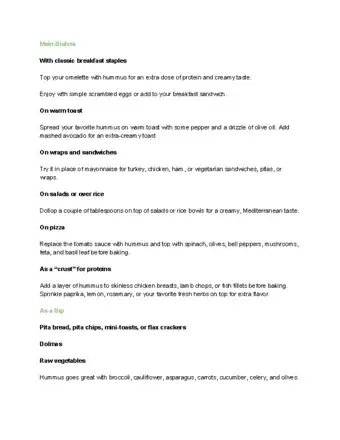

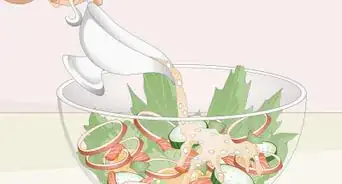

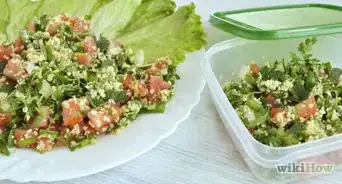
-Step-6.webp)


-Intro.webp)









